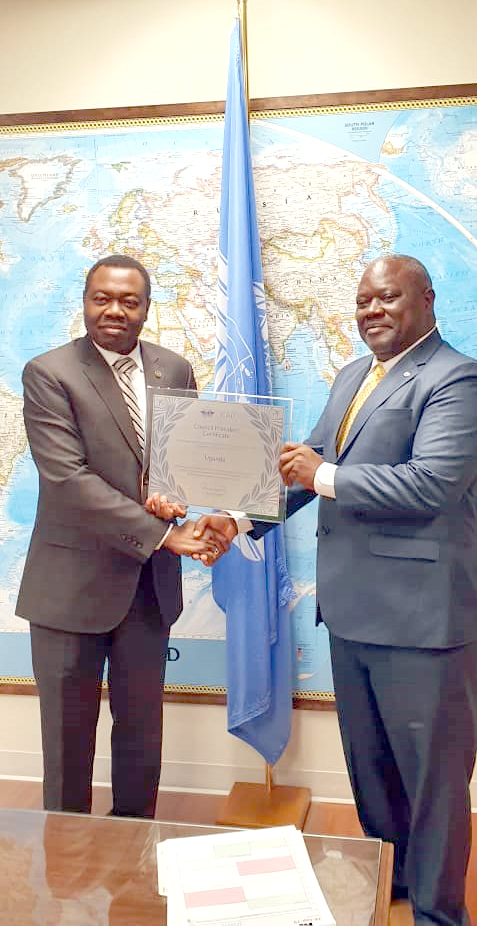Business
Uganda’s Aviation Industry gets International Recognition

State Minister for works Bagiire receiving the ICAO award
Uganda’s aviation sector has received a major boost as one of the countries that have maintained the highest standards of aviation security.
This is illustrated by the recent decision by global aviation body the International Civil Aviation Organisation (ICAO) to decorate Uganda with the ICAO Council President’s Certificate in Aviation Security 2019.
The award was established in support of ICAO’s “No Country Left Behind” Initiative.
Uganda’s Minister of State for Works Aggrey Bagiire received the award from Mr. Olumuyiwa Benard Aliu, the President of the Council of the International Civil Aviation Organisation (ICAO) at a special ceremony at the ICAO headquaters in Montreal Canada at the beginning of October 2019.
The award was made in recognition of Uganda’s outstanding efforts in resolving aviation security deficiencies. This followed an outstanding performance by Uganda in the Universal Security Audit Programme – Continuous Monitoring Approach (USAP – CMA) conducted by ICAO in 2017.
From the audit, Uganda secured an excellent score of 81.8% from the USAP – CMA Audit, which was well above the global average of 73% and also well above the African and Indian Ocean (AFI) States average of 58%.
UCAA’s Director General Dr. David Mpango Kakuba has described the award as a sign of approval of the measures taken by UCCA to bring about security in the aviation sector.
“The Award is a vote of confidence in Uganda’s Aviation Security systems,” says Dr. Kakuba in an email interview with our reporter.
Minister Bagiire assured the International Civil Aviation Organisation (ICAO) General Assembly of the commitment by Government of Uganda to maintain safety and security in the aviation sector.
Following the achievement in Montreal, Dr. Kakuba is optimistic that the forthcoming audit – ie the Universal Safety Oversight Audit Programme that is scheduled next year between July 21-28, 2020 will lead to similar results.
The sense of optimism arises partly from the recent developments including the Amendments to the Civil Aviation Authority Act that empowered inspectors to conduct spot checks on licensed airlines and aerodromes without having to first seek permission from them, as was the case previously.
Dr. Kakuba, also told stakeholders in a recent meeting that the creation of an independent accident and investigations unit that is not funded by CAA, was one of the key achievements in 2018 because of its importance in ensuring safety and security of passengers.
He noted that the absence of an independent accident and investigations unit, had cost Uganda several points by International Civil Aviation Organisation (ICAO) during a recent audit exercise. The last Universal Safety Oversight Audit Programme was carried out in 2014.
“Several audits on Uganda pointed out areas of weakness in Uganda’s legislation that called for amendment and this has previously led to low scores in such audits,” said Dr. Kakuba.
Besides, the emended CAA Act gives the aviation industry regulator new powers to carry out spot checks on any licensed aircraft and aerodromes without having to first seek permission from them.
Indeed, experts in the sector have observed that the previous provisions that gave operators the right to be informed prior to being examined constituted a major gap in enforcing safety regulations because it gave operators freedom to accommodate any excesses. It is anticipated that the new provisions will ensure that operators maintain the highest standards of safety for fear of losing their licenses the moment inspectors find shoddy work.
The renewed sense of optimism also arises from the fact that UCAA has embarked on several development projects that seek to improve safety of passengers and equipment at the airport.
These include a new fuel hydrant line and fuel firm that are being installed. The ongoing expansion of the terminal building, is another key aspect of the safety enhancement campaign in the sense that it seeks to create sufficient space for passengers.
This is especially critical in view of the rapid increase in passenger traffic going through Entebbe that have brought about long queues. In 2018, Entebbe handled 1.84m passengers, 190,000 more passengers recorded in just one year. It is anticipated that the ongoing projects will expand Entebbe’s capacity to 3.5million passengers at the completion of the first phase of the redevelopment projects in 2021.
The ongoing construction of the new 100,000 metric tone capacity cargo centre at Kigungu, will further create space for the construction of a new Terminal building erected in the area where the current cargo centre is standing. The new cargo centre is expected to be ready by the end of 2021.
Meanwhile, a Terminal operations Control Centre has also been erected by Korea International Cooperation Agency (KOICA) to ensure automation of operations as part of a USD 9.5 Million grant by the Government of South Korea.
Comments


























